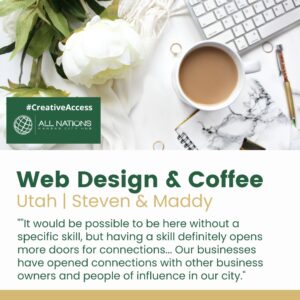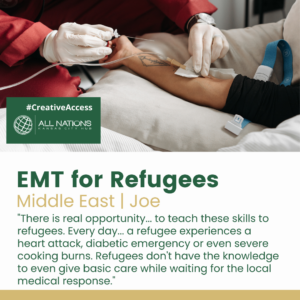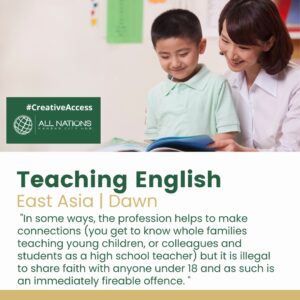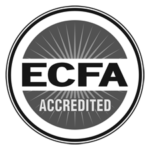We asked All Nations missionaries around the world to share how their professions, which give them Creative Access to their countries, help or hinder them. Also check out Creative Access: Pros and Cons, Creative Access: Land & Animals, and the next three blogs which will also have stories on this topic!
Web Design & Coffee Cart in Utah: Steven and Maddy
 Path: Steven studied Computer Information Systems in college and then worked in digital marketing. Maddy worked in coffee for about four years before we moved to Utah. We didn’t know we would be going on the mission field when we learned these skills, but after moving to Utah, God made it clear that he was going to use what we had learned to reach the people here.
Path: Steven studied Computer Information Systems in college and then worked in digital marketing. Maddy worked in coffee for about four years before we moved to Utah. We didn’t know we would be going on the mission field when we learned these skills, but after moving to Utah, God made it clear that he was going to use what we had learned to reach the people here.
Help or Hinder: Our businesses have helped us develop many relationships we wouldn’t have otherwise been able to make. Our coffee business has given us a very practical outlet to serve people in a place where it can be difficult to find physical needs that need to be met.
Access: It would be possible to be here without a specific skill, but having a skill definitely opens more doors for connections. For us specifically, our businesses have opened connections with other business owners and people of influence in our city.
EMT in the Middle East: Joe
 Path: In my journey to the Middle East I was approached by someone who worked in the region and was told that having medical training can open doors into every country in the M.E. and actually the 10:40 window in General. He really encouraged my to pursue EMT/Paramedicine as an option for creative access. So I went through the process to get trained and licensed as an EMT.
Path: In my journey to the Middle East I was approached by someone who worked in the region and was told that having medical training can open doors into every country in the M.E. and actually the 10:40 window in General. He really encouraged my to pursue EMT/Paramedicine as an option for creative access. So I went through the process to get trained and licensed as an EMT.
Help or Hinder: I moved here to learn Arabic. In my time here, I have found that there is a real opportunity for someone to teach medical skills to refugees. Every day there are instances where a refugee experiences a heart attack, diabetic emergency or even severe cooking burns are common. Refugees, however, don’t have the knowledge to give even basic care while waiting for the local medical response.
I have also learned that in Arabic most medical terms and communication is done with the English vocabulary, so those who haven’t gone through medical training wouldn’t understand the vocabulary. That creates some problems for teaching, but this education is greatly needed and would be lifesaving. My involvement up till now has been pretty minuscule because I am studying language full time. But I know God will use it because He led me to learn it!
Access: I am new to my country and here as a language learner. I am not yet at a language level to adequately teach these skills, and my current access to the country is as a student.
English Teacher in Asia: Dawn
 Path: I am an English teacher (MA in teaching English, and a CELTA – Certificate in Teaching English to Speakers of Other Languages – which I got some time ago), and my husband has a master’s in another subject, and got an online TESOL (Teaching English to Speakers of Other Languages) Certificate just before we moved here, making it very easy for us to get well-paid, stable jobs with legal visas.
Path: I am an English teacher (MA in teaching English, and a CELTA – Certificate in Teaching English to Speakers of Other Languages – which I got some time ago), and my husband has a master’s in another subject, and got an online TESOL (Teaching English to Speakers of Other Languages) Certificate just before we moved here, making it very easy for us to get well-paid, stable jobs with legal visas.
Help or Hinder: We knew there was a need for qualified English teachers before we came and the reality is the market, especially in the wake of COVID, is very good for teachers like us. We have limited work hours (not the 9-9-6 culture of some businesses in our country), weekends off and lots of vacation time to use however we choose. This time outside of work is a huge benefit to being in this profession, allowing us more space to build community with neighbors and friends.
In some ways, the profession helps to make connections (if a kindergarten teacher, you get to know whole families, for me as a high school teacher I only know my colleagues and the students) BUT it is illegal to share faith with anyone under 18 and as such is an immediately fireable offense. Connections with colleagues, and with the parents of younger children, is much easier.
Access: It would be very difficult to live here without a profession. The only real alternative is to be a student, but this can only be for a couple of years.
—
Learn about getting trained to ignite a church planting movement (as a full time missionary or a tentmaker!), and the path to the field with All Nations.

